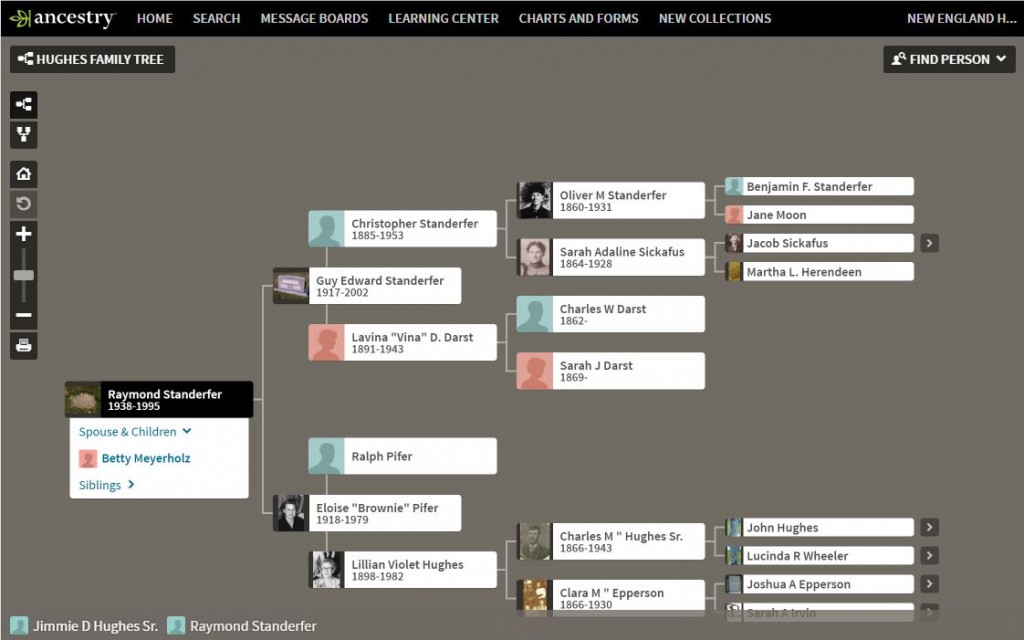 As someone who has been doing her genealogy since the 1980s, I can remember a time before there were many genealogy software options, let alone online databases. In fact, I started my genealogy on forms in a big legal size binder that I would take with me to the library as I scrolled, page by page, through microfilmed census records. Because I started so long ago, most of my research time – when I actually do get a chance to work on my own family – is concentrated on the generations furthest removed in time from the present. Continue reading Revisiting parents and grandparents
As someone who has been doing her genealogy since the 1980s, I can remember a time before there were many genealogy software options, let alone online databases. In fact, I started my genealogy on forms in a big legal size binder that I would take with me to the library as I scrolled, page by page, through microfilmed census records. Because I started so long ago, most of my research time – when I actually do get a chance to work on my own family – is concentrated on the generations furthest removed in time from the present. Continue reading Revisiting parents and grandparents
Category Archives: Genealogical Writing
ICYMI: Jump starting your genealogical research
[Author’s note: This blog post originally appeared in Vita Brevis on 19 December 2014.]
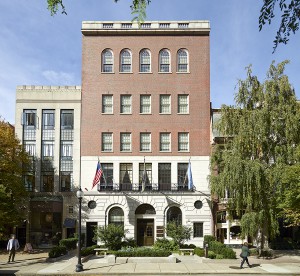 Consider sending a holiday letter out via email to your relatives. Then print a copy for posterity. – David Allen Lambert Continue reading ICYMI: Jump starting your genealogical research
Consider sending a holiday letter out via email to your relatives. Then print a copy for posterity. – David Allen Lambert Continue reading ICYMI: Jump starting your genealogical research
Thank an antiquarian
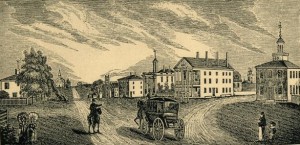
Genealogists and historians of Massachusetts are indebted to the works of nineteenth-century antiquarians: that is, compilers or collectors of historical information and antiquities. The works of several antiquarians – including John Warner Barber, Samuel Gardner Drake, and John Haven Dexter – have become crucial reference works in the study of Massachusetts genealogy. Knowing what these sources contain, along with their respective shortcomings, can be helpful when researching your Massachusetts ancestors. Continue reading Thank an antiquarian
Education by camper
 For reasons never fathomed or entered into by me, my parents loved to camp and travel. Mom’s mother called her a gypsy for following my Army dad around (they lived in nineteen places in the first 25 years of their marriage). My two older brothers got most of the tent camping phase, although I had my share, too. It was my fate alone, however, to participate in the motorized “camper” (i.e., recreational vehicle) phase.
For reasons never fathomed or entered into by me, my parents loved to camp and travel. Mom’s mother called her a gypsy for following my Army dad around (they lived in nineteen places in the first 25 years of their marriage). My two older brothers got most of the tent camping phase, although I had my share, too. It was my fate alone, however, to participate in the motorized “camper” (i.e., recreational vehicle) phase.
When I was in high school we moved from Massachusetts to St. Paul, Minnesota, because it was where my Dad could find work in 1962. RV trailers, like those silver torpedo things, were around, but Dad found someone who was outfitting what I used to call a “bread truck” body as a drivable camper. Continue reading Education by camper
Buckman’s Tavern

Along with the Boston Marathon and a home Red Sox game, today Massachusetts observes Patriots’ Day. This holiday, the third Monday in April since 1969, commemorates the Battle of Lexington on 19 April 1775.[1] In Lexington, the reenactment of the battle begins in the early morning hours as the Regulars – the British soldiers – march toward the town’s Common, and the militia company exits the adjacent Buckman’s Tavern to gather on the Common, now known as Battle Green. Continue reading Buckman’s Tavern
Spring potholes
 Spring is pothole repair time in New England, and as I write this on April 4 southern New England is receiving up to 8 inches of snow with flash freezing predicted overnight, so there will be plenty of work this spring.
Spring is pothole repair time in New England, and as I write this on April 4 southern New England is receiving up to 8 inches of snow with flash freezing predicted overnight, so there will be plenty of work this spring.
A pothole that has been bugging me this winter is remembering exactly which citations I have proofed and which are yet to be done. I already use the color “highlighter” function in Word – yellow to indicate questions that need answering and green to indicate “This is the right date/name/fact despite what some other sources say,” etc. – but I’m now adding light grey highlights for footnote citations that have been proofed. Continue reading Spring potholes
The name DID change
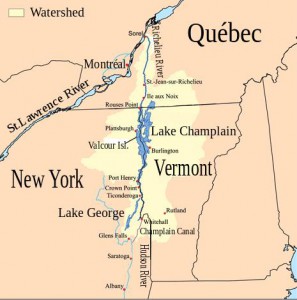
You’ve probably heard the story: “My ancestor’s name was changed at Ellis Island!” But you also probably know that this is a myth; immigration officials at Ellis Island did not randomly alter incoming passengers’ names. However, the surnames and given names of one group of immigrants, French-Canadians, frequently did change when our ancestors crossed the border.
Throughout the centuries, migration from Quebec was driven by poor agricultural conditions, overpopulation, and inadequate employment opportunities. Continue reading The name DID change
Making the skeletons dance

In his 1930 novel Immaturity, George Bernard Shaw wrote, “If you cannot get rid of the family skeleton, you may as well make it dance.” Shaw had a point with that statement. While we can deny them, hide them, or ignore them, we can’t remove the family skeletons from their places in our family trees. Once they’re “out of the closet,” those dry bones will walk around; what we make of them is up to us.
Scott C. Steward’s recent reposting of his article Genealogical Complexities brought to my mind the dilemma of all family history: how much do we really want to know, and what responsibility do we have in dispensing that information? Continue reading Making the skeletons dance
ICYMI: Genealogical complexities
[Author’s note: This post originally appeared in Vita Brevis on 3 September 2014.]
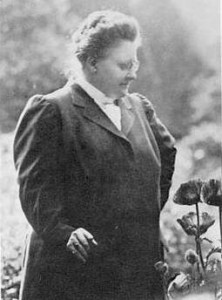 When I started out as a genealogical writer, I followed the model of genealogies published earlier in the twentieth century. The genealogical world they depicted was an orderly one, with generation after generation born in one place, married in another, and buried in a third. The greatest dramas I faced in writing my first book (The Sarsaparilla Kings, published in 1993) concerned cousins who deplored the information I had uncovered on their brief first or second marriages, information they were reluctant to see in print. Continue reading ICYMI: Genealogical complexities
When I started out as a genealogical writer, I followed the model of genealogies published earlier in the twentieth century. The genealogical world they depicted was an orderly one, with generation after generation born in one place, married in another, and buried in a third. The greatest dramas I faced in writing my first book (The Sarsaparilla Kings, published in 1993) concerned cousins who deplored the information I had uncovered on their brief first or second marriages, information they were reluctant to see in print. Continue reading ICYMI: Genealogical complexities
Modern book conservation at NEHGS
 Douglas Richardson’s Magna Carta Ancestry isn’t a particularly old or rare volume, but it is a frequently used resource in our collections. This massive reference book tracks family lines between medieval England and colonial America, making it a valuable source of information for researchers. Unfortunately, as our conservation technician Deborah Rossi discovered, the original binding of this book was too weak to support such frequent use. To help understand why, here’s some book anatomy 101: Continue reading Modern book conservation at NEHGS
Douglas Richardson’s Magna Carta Ancestry isn’t a particularly old or rare volume, but it is a frequently used resource in our collections. This massive reference book tracks family lines between medieval England and colonial America, making it a valuable source of information for researchers. Unfortunately, as our conservation technician Deborah Rossi discovered, the original binding of this book was too weak to support such frequent use. To help understand why, here’s some book anatomy 101: Continue reading Modern book conservation at NEHGS